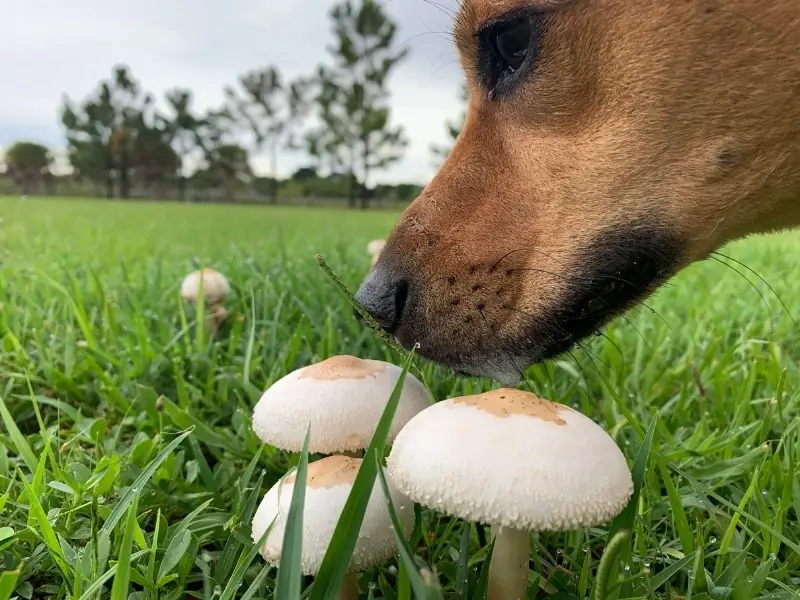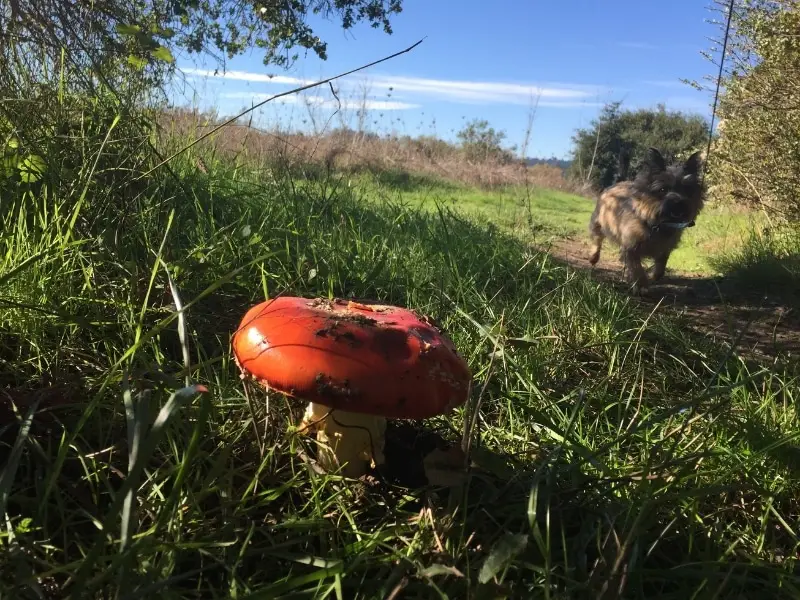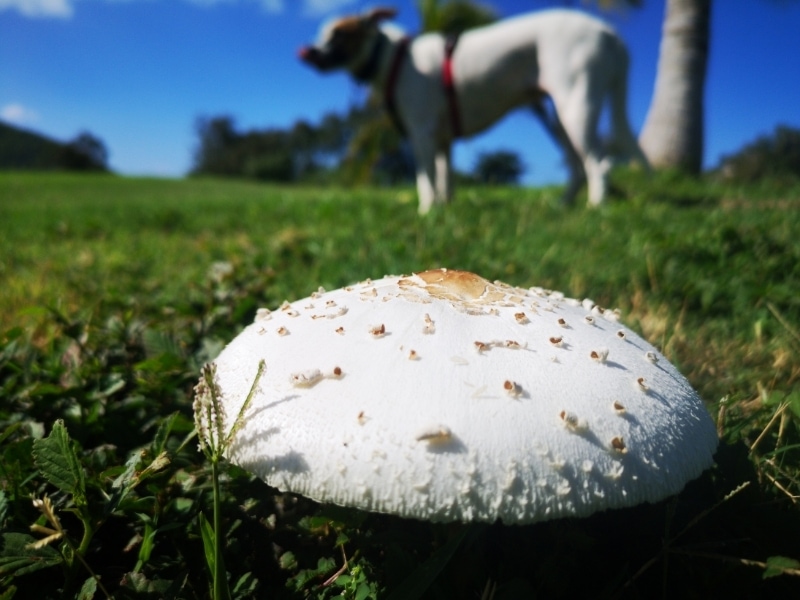Whether you just caught your dog sniffing mushrooms in the backyard or you want to share fungi as a healthy treat, you’re probably wondering are mushrooms safe or toxic to dogs. When it comes to dogs eating mushrooms everything depends on the exact species of fungi.
So, can dogs eat mushrooms? Dogs should only eat store-bought mushrooms that are safe for humans to eat. There are many different kinds of mushrooms, some of which are toxic to both dogs and people. Only grocery store mushrooms are safe for dogs and you shouldn’t feed your dog any type of fungi that you wouldn’t eat.
In this article, we’ll tell you everything you need to know about feeding mushrooms to your dog.
Are Mushrooms Good for Dogs?
While dogs can eat many different human foods, mushrooms can be a tricky food group. Unless you are a mycologist, you should only feed store-bought mushrooms to your dog!
There are many different types of mushrooms, but edible varieties that are safe for people are also safe for dogs to eat. However, some wild mushrooms can cause fatal poisoning in people and dogs, so be extremely careful when dealing with fungi (source).
Plainly cooked edible mushrooms are good for dogs and can be a great source of antioxidants and vitamins. Mushrooms are also low in calories and fat, so they can a healthy snack for overweight dogs.
Benefits of Mushrooms for Dogs

Plain, unseasoned mushrooms can be a great addition to your dog’s diet, and you can use them as a healthy snack or a low-calorie treat. The health benefits of mushrooms for dogs are:
1. Mushrooms Support Good Digestion
Mushrooms are naturally high in fiber that promotes good digestion and can also help your dog feel full longer. Eating fiber-rich veggies can regulate your dog’s bowel movement and help if your dog is constipated or has diarrhea.
2. Mushrooms Promote Nerve & Muscle Health
Mushrooms are a good source of potassium, an electrolyte that is vital for your dog’s overall health. This mineral assists in the functioning of nerves, muscles, and helps the heart to pump the blood through your dog’s body.
3. Mushrooms Promote Brain Health
Edible mushrooms are a good source of vitamin B6 which is involved in several functions within the body and supports overall health. One of the major benefits of this vitamin is that it promotes brain health and may reduce the risk of cognitive disorders that are commonly seen in senior dogs.
Furthermore, vitamin B6 promotes healthy growth and development in puppies and helps maintain a sodium-potassium balance within your dog’s body (source).
4. Mushrooms Contain Protein
Some mushrooms contain proteins, which help keep your dog energized and also build lean and strong muscles. While mushrooms have less protein than meat, they can boost your dog’s protein count if you feed them as healthy treats.
Risk of Mushrooms for Dogs

While edible mushrooms are safe and can improve your dog’s overall health, a poisonous mushroom will quickly send your dog to the emergency vet clinic. Hence, only feed your dog mushrooms that you would eat yourself.
Although edible mushrooms are safe, they can still cause problems in some dogs. The most common side effect is:
1. Upset Stomach
You should only feed cooked mushrooms to your dog since raw mushrooms can cause an upset stomach. If your dog has eaten raw mushrooms it can get sick and experience stomach problems such as vomiting and diarrhea.
What Kind of Mushrooms Can Dogs Eat?
All dog owners that plan on feeding mushrooms to their dogs, have to know which species of mushrooms dogs can eat safely and which ones are toxic. If you suspect that your pooch has eaten a poisonous mushroom, call poison control or take your dog to the vet stat!
Wild Mushrooms
As mentioned above, if you aren’t a mycologist you shouldn’t let your dog eat any type of mushroom that is growing in the wild! The same applies to any mushrooms that grow in your backyard.
To prevent mushroom poisoning in dogs, check your backyard regularly and remove any mushrooms that you find. Also, it is best to keep your dog on a leash if you’re going hiking in forests or national parks.
Here’s a list of the most common species of poisonous mushrooms you and your dog may come across (source):
- Amanita phalloides, known as the death cap
- Amanita gemmata, also known as the jeweled death cap
- Amanita muscaria. Known as the fly agaric or deadly agaric
- Galerina marginata, or funeral bell
- Gyromitra species, known as the false morsel
- Inocybe species and Clitocybe dealbata mushrooms
If your dog eats a mushroom during a hike, don’t waste a second on identification, instead, call your vet or poison control right away! It may be helpful to take a sample of the toxic mushroom and bring it to your vet.
Store-Bought Mushrooms
If you want to include mushrooms in your dog’s diet, do so using organic store-bought mushrooms. The following types of mushrooms are completely safe for dogs and can be found in grocery stores:
- Portobello
- Cremini
- White button
- Reishi
- Porcini
- Maitake
- Shiitake
Symptoms of Mushroom Poisoning in Dogs
The symptoms of mushroom poisoning will largely depend on the type of mushroom and the amount your dog ingested. The most common signs of toxic mushroom ingestion include:
- Vomiting
- Diarrhea
- Salivation
- Lethargy
- Weakness
- Staggering gait
- Coma
- Seizures
- Tremors
- Liver failure
- Jaundice
- Death
If your dog experiences any of these symptoms and you suspect that they ingested a potentially toxic mushroom, call your vet right away. Fast reaction and immediate treatment can mean a difference between life and death!
How Much Mushrooms Can a Dog Eat?
Feed mushrooms to your dog as you would any other human food – in moderation as a treat. This means that mushrooms shouldn’t make more than 10 percent of your dog’s daily calorie intake.
If you still aren’t sure how much mushrooms your dog should eat, talk with your vet. They will be able to tell you what is the appropriate amount for your dog based on their size, age, and activity level.
How to Feed Mushrooms to Your Dog?
Wash and thoroughly clean mushrooms to remove all the dirt before cooking them for your dog. Dogs can’t really digest raw mushrooms, so you will need to cook them every time you plan on feeding them to your dog.
Also, don’t add any seasoning, onions, or garlic, since they can be toxic and cause digestive problems in dogs.
Popular ways to feed mushrooms to dogs are:
- Cook sliced mushrooms and serve them as treats
- Mix plainly cooked mushrooms with your dog’s food
- Cook mushrooms in chicken broth for the added flavor
- Use a small amount of olive oil to sauté mushrooms
Conclusion
Mushrooms are safe and good for dogs to eat, as long as you stick with store-bought varieties. Edible mushrooms are a great source of antioxidants, can boost your dog’s immune system and be a healthy low-calorie treat.
Don’t forget, some types of mushrooms are poisonous to dogs, so keep a close eye on your pooch when you’re out and about in wooded areas. And if by any chance your dog manages to eat a wild mushroom, call poison control or take it to the vet right away!
Related Articles:


0 Comments